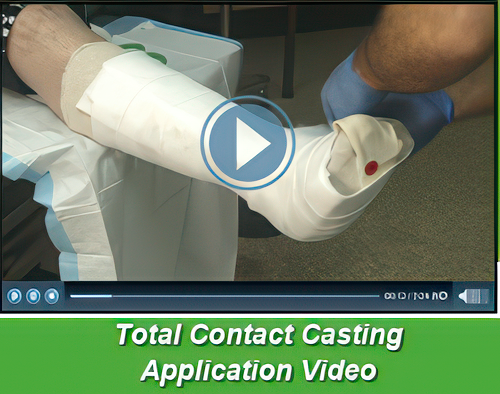Reimbursement for Total Contact Casting
Reimbursement for the application of a Total Contact Cast (TCC) involves specific coding and billing practices that vary depending on the healthcare setting and payer policies. Here's an overview:
CPT Code for TCC Application:
The application of a rigid total contact leg cast is identified by Current Procedural Terminology (CPT) code 29445. This code is used by physicians and qualified healthcare professionals to bill for the service across various settings, including physician offices and hospital outpatient departments.
Source: HMP Global Learning Network
Physician Office Setting:
- Procedure Code: When a physician applies a TCC in their office, they bill using CPT code 29445.
- Supply Codes: Since the physician incurs the cost of casting supplies, they can bill separately for these materials using appropriate Healthcare Common Procedure Coding System (HCPCS) codes, such as Q4038 for fiberglass cast supplies.
Source: HMP Global Learning Network
Hospital Outpatient Setting:
- Procedure Code: In this setting, the physician bills for the application using CPT code 29445.
- Supply Billing: The hospital typically bills for the casting supplies. Medicare assigns Ambulatory Payment Classification (APC) codes for such procedures. For instance, CPT 29445 is linked to APC 5102, which pertains to Level II Strapping and Cast Application.
Reimbursement Rates:
Reimbursement rates can vary based on the setting and payer. As of 2021, the Medicare Physician Fee Schedule for CPT 29445 was approximately $102.24, with a work Relative Value Unit (RVU) of 1.78. In hospital outpatient facilities, the APC 5102 had a base payment rate of $241.17.
Concurrent Procedures:
It's important to note that when both a debridement and a TCC application are performed on the same anatomical site during the same encounter, Medicare may not reimburse separately for the TCC application. According to the National Correct Coding Initiative (NCCI) Policy Manual, casting/splinting/strapping should not be reported separately if a restorative treatment or procedure is also performed on the same site.
Billing Considerations:
- Modifier Usage: In certain cases, modifiers may be required to indicate distinct procedural services. For example, if a debridement and TCC application are performed on different anatomical sites, appropriate modifiers should be used to denote separate services.
- Payer Policies: Reimbursement policies can vary among different payers. While Medicare has specific guidelines, commercial insurers may have different rules regarding the billing of TCC applications, especially when performed alongside other procedures.
Source: Wound Care Weekly
Conclusion:
Proper coding and billing for TCC applications are essential to ensure appropriate reimbursement. Healthcare providers should stay informed about current coding guidelines, payer-specific policies, and any updates to reimbursement rates to optimize billing practices for TCC procedures.
Copyright © M-Med - All rights reserved.

